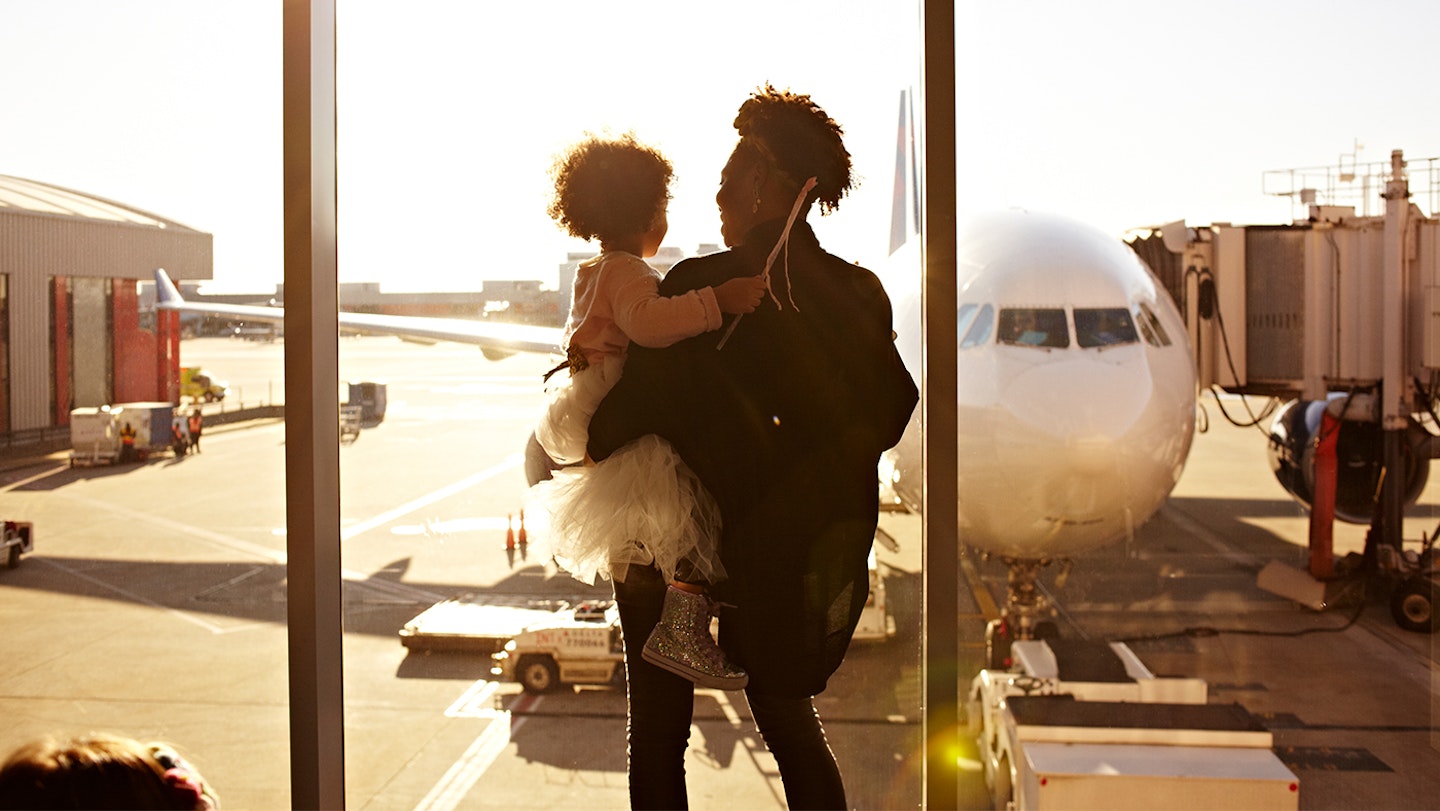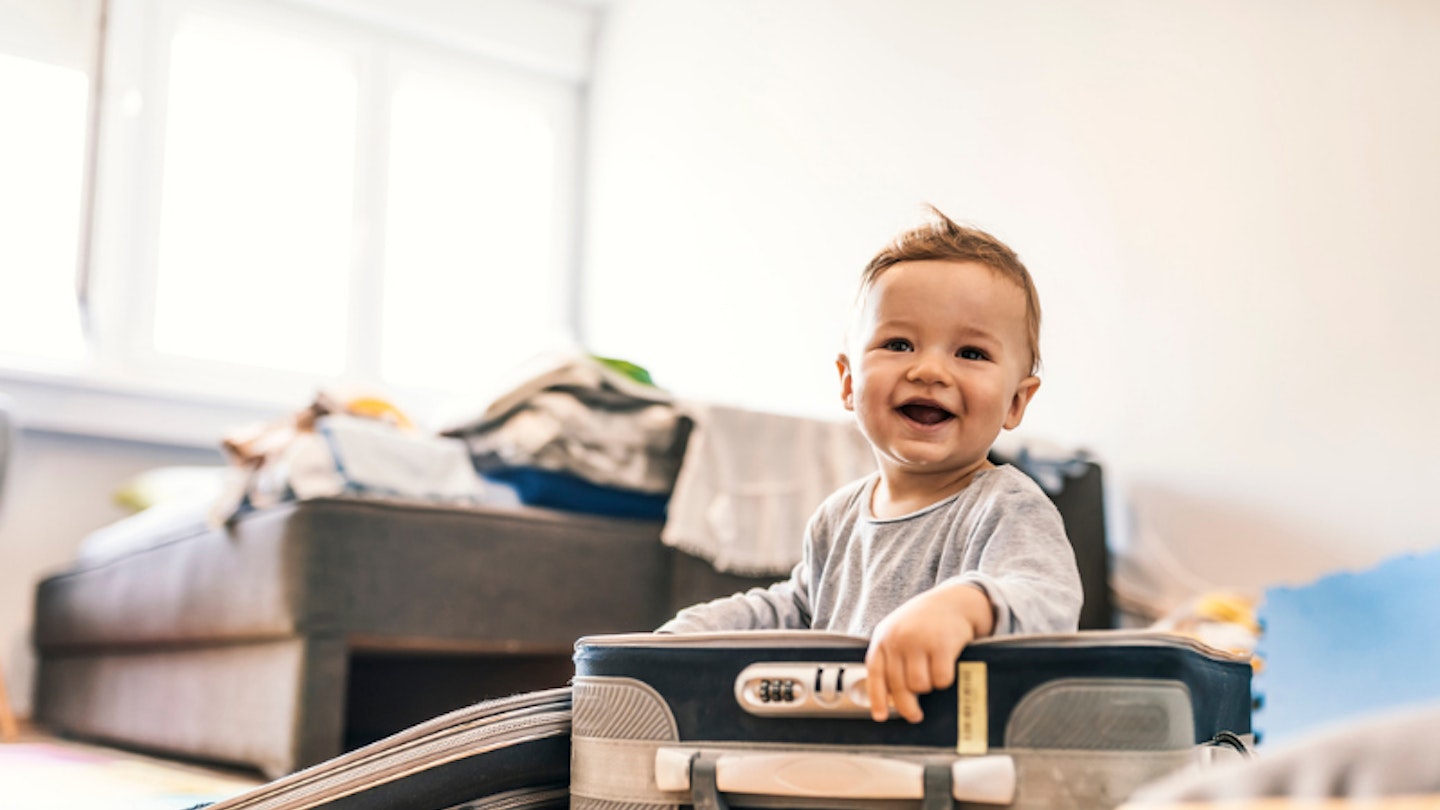We're sure you're itching to get away on a family holiday sometime soon, and whether you're travelling with your newborn baby, tyrannous tot, or kids who are excited to explore the big wide world, you're going to want to get them covered with travel insurance.
Not only will it give you all some peace of mind, but it will also protect your child should anything unfortunate occur such as falling ill or getting injured, or if you happen to misplace their passport.
But do babies even need travel insurance? What are the options for kids, and what should you consider in your travel insurance policy?
We've done the research and found out everything you need to know to make sure your little one is covered, safe, and sound.
Do babies need travel insurance?
According to MoneySuperMarket, everyone in your family should have travel insurance, including toddlers and newborn babies.
It's also worth making sure that any larger baby accessories, such as travel cots and buggies, are insured too if they're being kept in the hold, and are securely packed to avoid damage. This is particularly important if you plan on taking a travel stroller with you as you might be asked to check this in on particularly busy flights.
If you're planning to travel by air, you should check with your GP or paediatrician first and foremost for their recommendation as to whether your baby can fly. You should also check the airline's policy for travelling with infants - while many budget airlines will let children fly from as young as a few weeks old, some might have different requirements.
What if I don't take out travel insurance?
Without the right cover while you're away, you risk paying a lot of money for any healthcare treatment or drugs needed to treat any health issue that might occur. Depending on where you travel and what health issue you're suffering from, this can cost anywhere from a few thousand to hundreds of thousands of pounds, so it's definitely worth taking out insurance.
Your insurance should also cover any costs of any lost or damaged luggage as well as costs relating to delays and cancellations.

Do children need an EHIC or CHIC card?
Before you travel, you should make sure to get your child a free health insurance card that gives them the right to state-provided healthcare during your stay in the country you're visiting.
However, your card is not a substitute for travel insurance so you should make sure to arrange this as well.
EHIC
If you and your baby or child are travelling to a country that is part of the European Economic Area, and if you have rights under the Brexit Withdrawal Agreement, you'll need to arrange for a European Health Insurance Card (EHIC) to give them access to free or discounted medical treatment in the EU.
GHIC
For most people post-Brexit, the UK Global Health Insurance Card (GHIC) replaces the EHIC card if you're a UK citizen.
To apply for this free healthcare cover abroad, visit the NHS website where you can enter your own details and arrange cover for yourself or any additional family members.
What are the options for kids' travel insurance?
There are a number of travel insurance options available for children, dependent on who they are travelling with:
Standard travel insurance policy: This will apply if your child is travelling alone and is standard for all travellers regardless of age. However, the majority of travel insurance policies won't allow a baby to have their own - they'll most likely need a policy with an adult.
Family travel insurance policy: This will apply if your child is travelling with you as a family. Family travel insurance covers one or two adults and anywhere between one to eight children, all of whom have to be under 18 and live in your home. If you only have one child, you could look into getting a couple's travel insurance policy and buying separate standard travel insurance for your child. This might work out cheaper than the family cover so is worth investigating.
Group travel insurance policy: This will apply if your child is travelling with non-family members. If you are not the organiser of the trip, check if group travel insurance has been arranged. If not, you might want to buy standard travel insurance for your child to be sure.
Single trip: This is best if your little one is only going to be travelling once or twice in the year.
Annual cover: If you like to travel with your family a lot, then it's best to go with an annual cover option because it'll save you from taking out a separate policy each time you go away. Just make sure your annual policy covers everywhere you might be visiting and not just Europe or the US.
What should I consider when buying children's travel insurance?
When buying your child's travel insurance you should make sure it covers any pre-existing medical conditions they have so they can get access to the medication they need or if their medication is lost.
Whether you're taking a single-trip or multi-trips could affect the cost of your insurance, with multi-trip coverage being a better option if you plan to travel from country to country, or to various countries from the UK in a short span of time.
You should consider what extra cover you or your child may need, depending on what your holiday entails and what you plan to bring. Additional cover options could include expensive items, sports insurance, and loss of luggage. With this, you should also keep an eye out for any exclusions so you have all the basics to keep your little one covered.
What should the insurance cover?

As a basis, your travel insurance should cover the following:
• Medical expenses – This should cover any illnesses your child gets while on holiday or accidents that happen to them.
• Repatriation – If your child does get poorly or have an accident, it might be best that they're treated back in the UK and you'll want to know that the costs of getting your family home is covered.
• Cancellations – It's always a good idea to make sure you're covered for any cancellation or delays that might occur.
• Theft, loss, and damage – This will cover you in case your luggage or belongings get damaged, lost, or stolen.
If your child is likely to be partaking in activities or sports that have specific risks, you should check that these are covered too. It's a good idea to get this if you'll be doing any skiing, water sports, climbing, or hiking.
What won't be covered by under-18's travel insurance?
You'll probably find the following is excluded from most child travel insurance policies:
• As with most travel insurance policies, you'll need to declare any pre-existing medical conditions your child has when filling out your insurance documents. This is very important, as you might not be covered if you don't declare them.
• If you choose to cancel your trip before the holiday, it's unlikely you'll be covered for any costs you lose because of this.
• While it's unlikely you'll be taking your family anywhere where the Government advises you don't travel, if you do decide to go somewhere that's on the list of places you shouldn't be travelling, it's unlikely an insurance policy will cover you.
Where can you find travel insurance for babies and children?
As well as searching comparison websites such as Compare The Market, GoCompare, and MoneySuperMarket to find the best deals available, we've listed providers many of whom provide enhanced Covid-19 cover too.
Voted best insurance provider by the Globe Travel Awards 2020
Holiday Extras offers:
• Single and annual multi-trip travel insurance cover
• Group and family travel insurance
• Medical travel insurance with Covid-19 cover included on new policies
• Worldwide, Europe, or UK-based travel insurance
• Enhanced Covid-19 protection
• Optional extras include gadget cover, winter sports, extreme sports, and additional activities
• Available with three levels of cover: Bronze, Silver, and Gold
• Up to £15 million medical cover and £5,000 cancellation cover
Find out more about their cover options and get a travel insurance quote.
Winner of Best Travel Insurance Provider 2020 in the British Travel Awards
Staysure offers:
• Single and annual multi-trip travel insurance cover
• Group and family travel insurance
• Medical travel insurance with Covid-19 cover on all new policies
• Worldwide, Europe, or UK-based travel insurance
• Superior-rated Covid-19 travel insurance
• Long-stay travel insurance
• Winter sport cover
• Optional extras include connecting flight cover, gadget cover, single item cover, travel disruption cover, terrorism cancellation cover, and European FCDO travel advice extension
• Available with two levels of cover: Basic and Comprehensive
• Unlimited medical cover, and up to £5,000 cancellation cover
Find out more about their cover options and get a travel insurance quote.
AXA offers:
• Single and multi-trip travel insurance cover
• Family travel insurance
• Pre-existing medical condition cover
• Sports and activities cover
• Winter sport cover
• Each available with three levels of cover: Bronze, Silver, and Gold
• Up to £15 million medical cover, and up to £5,000 cancellation cover
• Policies with Covid-19 cover
Find out more about their cover options and get a travel insurance quote.
Admiral offers:
• Single and annual multi-trip travel insurance cover
• Group and family travel insurance - Children need to be added to adult policies and under-18s can't buy their own cover separately
• Student travel insurance
• Pre-existing medical condition insurance
• Covid-19 cover now included on policies as standard
• Worldwide, Europe, or UK-based travel insurance
• Optional extras include a range of activities, gadget cover, and winter sports
• Available with three levels of cover: Admiral, Admiral Gold, and Admiral Platinum
• Up to £20million medical cover and £5,000 cancellation cover
Find out more about their cover options and get a travel insurance quote.
RAC offers:
• Single and annual multi-trip travel insurance cover
• Family travel insurance
• Pre-existing medical conditions insurance
• Worldwide, Europe, or UK-based travel insurance
• Covid-19 cancellation cover as standard
• Optional extras include gadget cover, winter sports, and cruise cover
• Available with three levels of cover: Orange, Silver, and Black
• Unlimited medical cover and £7,500 cancellation cover
Find out more about their cover options and get a travel insurance quote.
Winner of the Best Travel Insurance Provider award at the Your Money Awards 2021
The Post Office offers:
• Single and annual multi-trip travel insurance cover
• Travel insurance and support for kids
• Family travel insurance
• Backpacker cover
• Pre-existing medical conditions insurance
• Overseas and UK-based travel insurance
• Covid-19 cover included
• Optional extras include gadget cover, winter sports, cruise cover, natural catastrophe and terrorism cover, enhanced trip disruption cover, and golf cover
• Available with three levels of cover: Economy, Standard, and Premier
• Up to £10million medical cover and £5,000 cancellation cover
Find out more about their cover options and get a travel insurance quote.
Sainsbury's Bank offers:
• Single and annual multi-trip travel insurance cover
• Family travel insurance
• Pre-existing medical conditions insurance
• Extended trip insurance cover
• Backpacker travel insurance
• Flexible worldwide and and UK-based travel insurance
• New policies sold from Oct 2020 have Covid-19 cover as standard
• Optional extras include winter sports and cruise cover
• Available with three levels of cover: Silver, Gold, and Platinum
• Up to £10million medical cover and £5,000 cancellation cover
Find out more about their cover options and get a travel insurance quote.
Travel tips for travelling with a baby or child
Babies and young children are susceptible to heatstroke, so you should try to avoid hotter countries in the summer months, and make sure you provide plenty of sun protection for their skin.
Make sure to check the safety advice for countries before you visit, to avoid the risk of taking your little one to a potentially unsafe environment. The latest information can be found on the Government’s foreign travel advice.
If your child needs liquid medicine or a specific dietary drink, and you need to carry more than 100ml of this in hand luggage, get a doctor’s letter or a prescription to verify this. You’ll also need a doctor’s note for children’s medicine only available on prescription, and for EpiPens.
If you're travelling with your baby, pack a survival bag and you’ll be just fine, whatever happens. Make sure it includes: a collapsible potty; change mat and nappies; hand sanitiser; wet wipes; nappy sacks, to seal away anything smelly; a full set of spare baby clothes; and an avocado or banana, with a fork or masher if your baby is weaning on purées.
See if you can reduce what you need to take with you by renting baby equipment, from pushchairs to toys, at your destination. In the UK, thebabyloft.co.uk hires baby equipment, while kidelio.com covers France. Whatever your destination, Google ‘baby equipment rental’ to find out more.
Work out whether you’ll need to use tap water or bottled water to make up feeds or to drink. In France, Italy, Germany, and most of Spain, tap water is safe to drink – you’ll still need to boil it before preparing a bottle though. Bottled water can contain high amounts of sodium and sulphate, so look for those with no more than 200mg of sodium (it might show on the label as Na) and no more than 250mg of sulphate (SO4) per litre. Again, you’ll still need to boil it, as it’s not sterile.
Stephanie Spencer is the Hub Editor at Mother&Baby and auntie to four aged 8 to 6 months old. With a particular interest in health, she loves discovering products that make parent’s lives easier.







